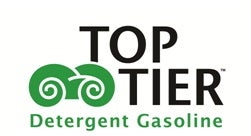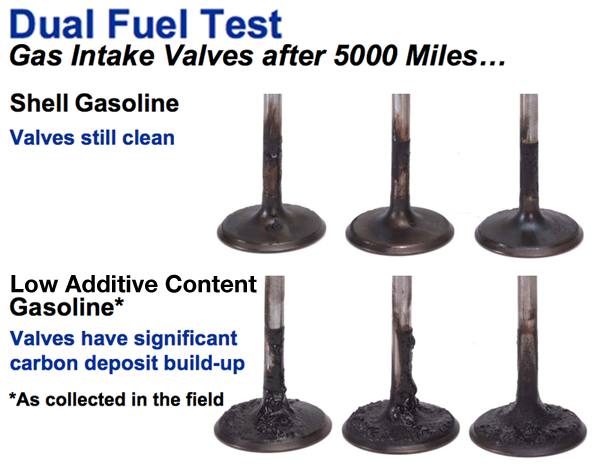 "Nymphicus Hollandicus" (nymhicus-hollandicus)
"Nymphicus Hollandicus" (nymhicus-hollandicus)
10/14/2015 at 12:41 ē Filed to: Gas, Top-Tier Gas, Speedway
 1
1
 14
14
 "Nymphicus Hollandicus" (nymhicus-hollandicus)
"Nymphicus Hollandicus" (nymhicus-hollandicus)
10/14/2015 at 12:41 ē Filed to: Gas, Top-Tier Gas, Speedway |  1 1
|  14 14 |
I know gasoline is mostly the same, but apparently some arenít. When checking out gas prices near my internship (itís on average 10 cents cheaper) Iíve noticed this sign on some gas stations (BP, Sunoco, Exxon). As someone who filled their car up with Speedway and Gulf for a while this worries me.

A quick search reveals that this gas is more clean than what is mandated by the EPA as well as recommended by several manufacturers, including Honda. While I have read that it is better for your car but it is more expensive than non Top Tier stations, some people are saying itís mostly a marketing myth to get people to pay more for gasoline.

Apparently there is some weight to this, but Iím not sure what to think about it. I would want to save money by getting cheaper gas by getting a speedway rewards card (10 cents off a gallon) but long term I want to keep my car running optimally. Even after using non Top-Tier gas for months on end, I donít notice a difference, but I want to take care of my car more. I already change oil, etc when it needs to be as well as get any lights/squeaks diagnosed right away so thatís my rationale. What do you say? Should I only fill up with Top-Tier gas for now on? Once every 5 or so fillups? Or donít bother?
 Supreme Chancellor and Glorious Leader SaveTheIntegras
> Nymphicus Hollandicus
Supreme Chancellor and Glorious Leader SaveTheIntegras
> Nymphicus Hollandicus
10/14/2015 at 12:46 |
|
Fill your car up with what you can afford, but go ahead and splurge every now and then if you want.
 Rico
> Nymphicus Hollandicus
Rico
> Nymphicus Hollandicus
10/14/2015 at 12:52 |
|
I guess it would depend on a variety of factors including, just how bad the gas you are getting is, does your car require premium or if you have a high performance car. Do you at least take your car up to redline to burn off deposits once in a while?
 HammerheadFistpunch
> Nymphicus Hollandicus
HammerheadFistpunch
> Nymphicus Hollandicus
10/14/2015 at 12:55 |
|
My father was an engineer for Chevron for several years, he explained to me that the reason discount gas is discount is not because they donít put quality detergents or additives in it, its because the product is a lower ďgradeĒ. Something to do with the way the fuel settles after the fracturing process means that the top tier fuels have a higher concentration of complete hydrocarbon chains and the lower tiers are less complete. The moral of the story is that its cheaper gas for a reason, which stands up to logic...how else could it be less expensive if it was the same? Wouldnít all retailers want to sell you less expensive gas if it was the same quality? My brother and I did an informal test with this one time, before the stupid E10 mandate, where we both drove on cheap gas for a month and then switched to top tier gas; obviously we couldnít validate wear or deposits but both of us experiences a mileage drop of about 10-15%, outside the margin of error. Long story short: cheap gas takes you less far and you end up paying about the same in the end.
 BobintheMtns
> Nymphicus Hollandicus
BobintheMtns
> Nymphicus Hollandicus
10/14/2015 at 12:56 |
|
I only use premium fuel, regardless of the motor. Gasoline is just a filthy soup of various hydrocarbons with some additives added to bring it into spec. The premium fuels will have a higher percentage of additives/cleaners as well as ethanol (which I, and my motors, like).
 Chariotoflove
> Nymphicus Hollandicus
Chariotoflove
> Nymphicus Hollandicus
10/14/2015 at 13:07 |
|
I remember being told by one of the chemical engineers at a refinery that the gas of a particular octane rating is the same wherever you buy it and that the differences in price you see are due to marketing. Take this third hand information for what itís worth, but I took it to heart and have never worried about where I buy my gas. My cars never seem to have suffered for it, and I keep them for at least 10 years. Now treating myself to a higher octane fill up now and again does make a difference in the power available to me, but thatís a different thing from the ďqualityĒ of the fuel I think you are asking about.
 GhostZ
> Nymphicus Hollandicus
GhostZ
> Nymphicus Hollandicus
10/14/2015 at 13:11 |
|
It looks to me like it would only be worthwhile if you used exclusively top tier gas from day 1, as itís pretty much just to just have less build-up on the valves. Iím skeptical on whether or not it would reduce existing buildup, so combining it with regular gas probably wouldnít do much, as youíd still get the regular buildup, just maybe curbed slightly. It also is not exempt from having an ethanol content.
Basically it looks like a brand certification for the same quality of gas that has been sold by Shell or Chevron for ages.
That being said, thatís just a keyboard pundit opinion and I am not an organic chemist.
 Rico
> HammerheadFistpunch
Rico
> HammerheadFistpunch
10/14/2015 at 13:16 |
|
Finally some facts behind it. Thatís good to know.
What about 2 top tier gas stations giving me different mileage? For example in my 2014 C300 if I fill my tank up completely with BP gas my range drops 25-40 miles total every time but when I fill with Shell I consistently get a high total range.
Also in my familyís CRV if we put midgrade instead of regular over the course of 3-4 fill ups we would get consistently more mileage (not by much maybe 10-15 miles) but the car only asks for regular. Why is that?
 cazzyodo
> Nymphicus Hollandicus
cazzyodo
> Nymphicus Hollandicus
10/14/2015 at 13:18 |
|
I was in supply chain for fuel for a couple years before I got a new job this summer. I scheduled gas across the country for our company and only heard minor differences in top tier gas.
Hereís a general overview of the process:
- Refiners produce gas of various grades based on the raw oil they receive. Yields for each type vary slightly based on where it comes from.
- Pipelines publish schedules for moving product along their lines. These schedules use ďcycleĒ timing through the year. A major one along the east coast sets the standard.
- Refiners sell their product through brokers to various customers (other refiners, suppliers, jobbers, wholesalers, etc).
- Refiners input product into the pipelines in accordance to the published schedule and the pipeline tracks the product movement for the owner (whoever bought the product) to see when the product arrives. Destinations are determined by the ownerís scheduler and the scheduling system used by the pipeline.
- Regular gasoline is a fungible product, which means it is all interchangeable. You donít own a specific gallon...you get the quantity you bought out of the enormous batch moving that cycle.
- Terminals (destinations) have large tanks to hold product. Your regular generic gas is mixed with Shells awesome gas and Mobilís whatever they call it. There isnít a difference. Yet.
- Trucks arrive at the rack (where they load and unload product) and key in codes to pick up product from a specific supplier (you or Mobil or Shell).
- The product that gets placed in the truck is dependent upon what the supplier specified with the terminal as their blend. Traditional blend is the gas with 10% ethanol (very few locations still ship and use straight gas) and the mandated additives. Anyone can sell top tier gas if they pay for it (a few extra cents per gallon, really). I was told that ďitís the difference between one squirt of additive and three squirts of additive per gallon.Ē It is a known quantity and anyone can sell top tier. Joe Schmoeís Convenient Store could advertise top tier gas if they bought it. Branded stations arenít terribly special.
What branded stations have are their own blends of additives. Shell does a few extra things that Mobil doesnít. Etc. Etc. Your research can be spot on but I was also told that the way our vehicles are built today, youíd be fine.
I saw prices posted for branded and unbranded gas from the same supplier. The $.10 difference (letís say itís that amount) guarantees supply, basically, to the branded stations. They are the first ones to get the gallons at the terminal before other contracts are fulfilled. If a hurricane hits and gas is short, unbranded gas could run up and out but branded stations will be the last ones with fuel in their tanks.
I should have just posted this to Oppo and linked it...got carried away.
Anywho, hope it helps!
 HammerheadFistpunch
> Rico
HammerheadFistpunch
> Rico
10/14/2015 at 13:21 |
|
in some cases its a mater of distance from distribution and time in tank. With E10 fuel especially fuel doesnít have a very high shelf life (2 weeks max before separation) so it could be a mater of which fuel has been sitting the longest in the tank, or even the condition of the tank. I had to replace 2 injectors once because of bad fuel I got at a chevron...it happens. As for the midgrade v regular it depends on a lot of variables but some computers will keep the timing more advanced with higher octane rated fuels over a broader range even with regular as specíd...sometimes its the opposite. In the summer we HAD to put premium in our supercharged suburban, but in the winter we got better mileage and no knock on midgrade because of the tempature and winter blends.
 d15b
> HammerheadFistpunch
d15b
> HammerheadFistpunch
10/14/2015 at 14:27 |
|
This.
I also use Chevron because supposedly the EPA (ha!) uses it for their emissions testing. Seems like a good idea.
 HammerheadFistpunch
> d15b
HammerheadFistpunch
> d15b
10/14/2015 at 14:30 |
|
Of course the epa gets to use non ethanol ruined gas
 d15b
> HammerheadFistpunch
d15b
> HammerheadFistpunch
10/14/2015 at 14:36 |
|
I did not know that. :(
 Captain Biptp
> Nymphicus Hollandicus
Captain Biptp
> Nymphicus Hollandicus
07/26/2017 at 10:52 |
|
It is sad that so many rely on subjective evaluations, misapplied analogies and private logic. AAA cited research done by Consumer Reports. Crude summary: after 4000 miles (just 4000), the difference in deposits on intake valves is significant.
At the fuel flow rates corresponding to very low rpms for high mpg, wouldnít injectors stay cleaner longer. And itís the level of detergent additives above the EPA minimums and not the grading that further keeps catalytic converters functioning longer.
 Anna
> Rico
Anna
> Rico
04/01/2018 at 13:30 |
|
It also depends on how fast the vehicle is driven and how many people drive it. Everyone has different driving habits